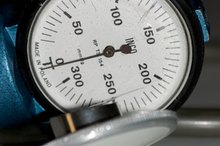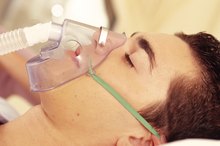The Effects of pCO2 on Respiration
The mechanisms that control respiration are part of an intricately woven system. The two main gases involved in respiration are oxygen and carbon dioxide. In healthy people, respiration is primarily controlled by the level of carbon dioxide dissolved in the blood. This is called the respiratory drive to breathe.
Partial Pressure of Carbon Dioxide
Carbon dioxide is created as a waste product of normal cellular metabolism. It's transported from the tissues to your red blood cells, where it's taken to the lungs. About 10 percent of carbon dioxide is found dissolved in your blood. The amount of pressure exerted by carbon dioxide dissolved in the blood is known as the partial pressure of carbon dioxide, or pCO2, according to Eastern Kentucky University. In healthy people, the normal level of pCO2 is 35mm to 45mm of mercury, says Orlando Regional Healthcare.
- Carbon dioxide is created as a waste product of normal cellular metabolism.
- The amount of pressure exerted by carbon dioxide dissolved in the blood is known as the partial pressure of carbon dioxide, or pCO2, according to Eastern Kentucky University.
Respiration
Causes of High Carbon Dioxide in the Blood
Learn More
Respiration is controlled by a section of the brain called the medulla. Lying on either side of the medulla are chemoreceptors that sense changes in the level of pCO2 in the blood. When the level of pCO2 becomes too high or too low, chemoreceptors send signals to the inspiratory center within the medulla to increase breathing or slow it. Chemoreceptors in the aorta and carotid arteries also play a lesser role in respiration by detecting changes in oxygen levels and the pH of blood, according to East Tennessee State University.
- Respiration is controlled by a section of the brain called the medulla.
- When the level of pCO2 becomes too high or too low, chemoreceptors send signals to the inspiratory center within the medulla to increase breathing or slow it.
Stimulation of Respiration
Respiration is stimulated by high levels of pCO2 in your blood. The primary cause of high pCO2 levels is hypoventilation. Pneumonia, atelectasis, pneumothorax, pulmonary embolus, chest injury, central nervous system depression and failure of the respiratory muscles are among the many causes of hypoventilation. When you hypoventilate, an adequate supply of oxygen is not delivered to the lungs and carbon dioxide begins to build up. Healthy people respond to this situation by breathing faster and deeper to remove excess carbon dioxide from the blood.
- Respiration is stimulated by high levels of pCO2 in your blood.
Inhibition of Respiration
What Are the Steps of Breathing?
Learn More
Low levels of pCO2 in your blood act to decrease respiration. Diminished pCO2 levels in the body are a result of hyperventilation. This may occur from anxiety, panic attacks, certain medications, pain, infections, central nervous system lesions, pregnancy, stimulants or excess thyroid hormone. Hyperventilation causes excessive amounts of carbon dioxide to be removed from the body, resulting in a drop in the pCO2 in your blood. This problem can be corrected by taking slow breaths or by breathing into a paper bag, according to Orlando Regional Healthcare.
- Low levels of pCO2 in your blood act to decrease respiration.
- Diminished pCO2 levels in the body are a result of hyperventilation.
Hypoxic Drive to Breathe
Normally, respiratory drive is controlled by the amount of pCO2 in your blood. However, at high altitudes where the oxygen tension is low or in people with chronic obstructive pulmonary disease, the hypoxic drive to breathe becomes favored. In these people, chronically high levels of pCO2 cause chemoreceptors to become less sensitive to pCO2 and more sensitive to the partial pressure of oxygen, or pO2. As the oxygen levels in the body drop, the pO2 chemoreceptors provide the hypoxic drive to breathe, meaning that their respiratory drive is stimulated by low levels of oxygen, rather than by high levels of carbon dioxide in normal circumstances, according to East Tennessee State University.
- Normally, respiratory drive is controlled by the amount of pCO2 in your blood.
- As the oxygen levels in the body drop, the pO2 chemoreceptors provide the hypoxic drive to breathe, meaning that their respiratory drive is stimulated by low levels of oxygen, rather than by high levels of carbon dioxide in normal circumstances, according to East Tennessee State University.
Related Articles
References
- Eastern Kentucky University: Respiration
- East Tennessee State University: Regulation of Respiration
- Castro D, Keenaghan M. Arterial Blood Gas. InStatPearls [Internet]. StatPearls Publishing. Updated February 1, 2019.
- Abdo WF, Heunks LM. Oxygen-induced hypercapnia in COPD: myths and facts. Crit Care. 2012;16(5):323. doi:10.1186/cc11475
- Cukic V. The changes of arterial blood gases in COPD during four-year period. Med Arch. 2014;68(1):14–18. doi:10.5455/medarh.2014.68.14-18
- Sood P, Paul G, Puri S. Interpretation of arterial blood gas. Indian J Crit Care Med. 2010;14(2):57–64. doi:10.4103/0972-5229.68215
Writer Bio
Kimberly Rienecke started her career as a health and fitness writer by working for various websites. She is a certified orthopedic physician assistant and an ACE-certified personal trainer. She also holds a Bachelor of Science in biology from Towson University.









